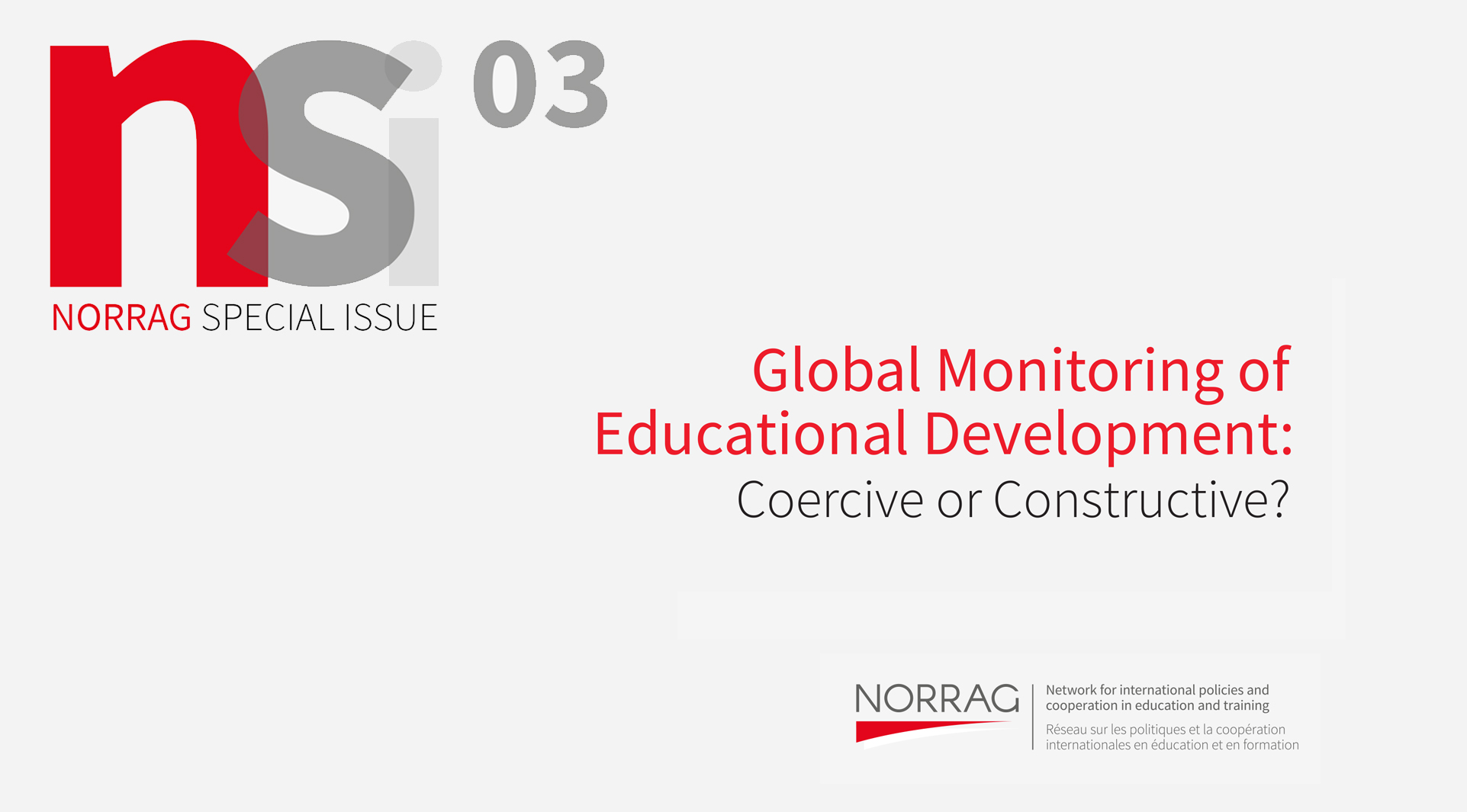Call for contributions - NORRAG Special Issue 03 Global Monitoring of National Educational Development: Coercive or Constructive?
NORRAG and the Interdisciplinary Program on Educational Policies and Practices (PIPE) of the Center for Economic Research and Teaching (CIDE), Mexico, invite specialists and stakeholders interested or involved in education to contribute with an article in Spanish or English in the second volume of:
NORRAG Special Issue 03 – Global Monitoring of National Educational Development: Coercive or Constructive?
NORRAG Special issue (NSI) is an open-source periodical. It seeks to give prominence to authors from different countries and with diverse backgrounds. Each issue is dedicated to a special topic of global education policy and international cooperation in education. NSI aims to bridge the gap between theory and practice as well as advocacy and policy in international education development.
The contributions are expected to be short pieces (typically around 1200-1500 words) or multimedia material that can speak to a wider audience of policymakers, academics, researchers, civil society organizations, and other actors working on education.
The objective of NORRAG Special Issue 03 is to analyze how global reports, such as UNESCO’s Global Education Monitoring Report, World Development Report and Global Monitoring Report of the World Bank, and OECD’s Education at a Glance, but also international standardized test such as PISA, TIMSS & PIRLS, and LLECE, influence the global development agenda, especially in Latin America, but more generally in the global South & East. What is the impact of these reports on global governance, agency and thematic focus? This issue seeks to question the possible disruptive effect, with positive or negative consequences, of global reports on national policies, and the feasibility of developing global recommendations in a world of diversity. It also seeks to show how national policy actors, members of civil society and national researchers make use of these reports.
Guiding sections and indicative issues and topics for the NSI 03 contributions:
Section 1. Participation in international monitoring efforts on education
- Objectives of the Global Monitoring Reports (GMR): What are and/or should they be?
- International Monitoring Efforts: Useful or devious tools for evaluating progress in education among nations?
- Rationale of nations/governments for participating in GMR and international monitoring efforts on Education
- Quality and usefulness of the GMR in education: Some are better than others?
Section 2. Dissemination of Global Reports’ results
- Communication strategies used to disseminate the results of GMR at the international, regional and local level: What type, from who and rationale?
Section 3. Reactions to the publication of the reports
- Government and policy actors’ reactions to GMR: Complimentary, critical or indifferent.
- Public opinion reaction to GMR: Main comments in the public sphere
- Interest groups, civil society members or stakeholders as users or critics of the GMR data to support their request for changes in education policy?
- Researchers as users and disseminating agents of the GMR?
Section 4. Global Reports’ Impact on Education Policy
- Countries’ governments response to GMR on education policy: to reform or to ignore
- GMR as parameter to measure success or failure in education policy: A reality?
- Impact of GMR on education quality around the globe: Positive, negative or none
- Recommendations-experiences-best practices highlighted in the GMR useful for the design, implementation and/or evaluation of education policy?
- GMR and international monitoring efforts on education: coercive or constructive
If you are interested in participating, we kindly request you to send a confirmation to contribute and a short abstract to marisol.vazquez@cide.edu by October 5. The deadline for submission of the final article is October 30th. Since we are asking for short articles, we will privilege those that are accurate, original and relevant. The issue seeks to include contributions not only from researchers, but also from civil society organizations, international organizations and stakeholders, among others, involved in education and who do not necessarily find a space to make their voices heard.
Volume 1 of the previous NSI analyzed the Right to Education movement: policies, practices, social movements, challenges, impact and models of collaboration between state and non-state actors. The volume was focused on three specific countries: India, South Africa and Brazil. Here is the link to the first volume, which has already been translated into 5 languages.
Guest editor: Marisol Vázquez Cuevas, Ph.D. Affiliated Professor, Interdisciplinary Program on Policy and Educational Practices of the Center for Economic Research and Teaching (PIPE-CIDE), Mexico.
Contact: marisol.vazquez@cide.edu

